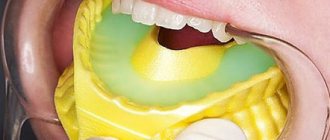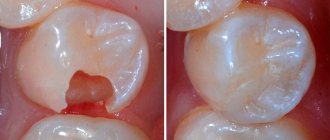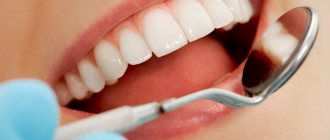1800
Most people want to have beautiful white teeth. However, not everyone has the opportunity or desire to periodically visit a dental clinic for a whitening procedure.
And some even believe that it is worth trying home techniques first before using the services of a professional.
One of the most famous ways to whiten enamel with home remedies is lemon .
There are many recipes that tell you exactly how to use this fruit to lighten your teeth enamel. In this article we will take a detailed look at not only possible techniques and recipes, but also talk about their positive and negative sides.
Alternative methods using folk remedies
This bright citrus is extremely healthy.
It contains a large amount of vitamin C and various microelements. Lemon strengthens the immune system, helps fight viral diseases, and saturates the body with vitamins. Thanks to its healing properties, the yellow fruit is successfully used in folk medicine. In addition, it has found application in cosmetology. The acids contained in its composition perfectly lighten the skin and nails. Lemon can also be used to whiten teeth. The active substances of citrus are able to return tooth enamel to its natural color in a short time. Lemon has the following effects:
- refreshes the oral cavity;
- removes plaque, returning the tooth covering to its natural whiteness;
- helps eliminate toothache;
- kills pathogenic microbes living in the mouth.
Anyone can try this home remedy. However, it is necessary to take into account that there is no allergy to citrus fruits. The condition of tooth enamel also matters. If it is damaged or too sensitive, it is not advisable to use acid for bleaching.
Lemon is a citrus that has a wide range of uses in our lives. It has an antibacterial effect, and due to its natural acid it is considered a good remedy for natural teeth whitening.
Benefits include:
- low cost and tangible results;
- preventing the proliferation of pathogenic bacteria;
- strengthening gums;
- prevention of caries;
- strengthening the immune system;
- fresh breath.
Composition of lemon per 100g:
- Vitamins:
- vitamin A: 0.010 mg;
- vitamin C: 40.0 mg;
- vitamin E: 0.5 mg;
- vitamin B1: 0.04 mg;
- vitamin B2: 0.02 mg;
- vitamin B3: 0.2 mg;
- vitamin B6: 0.06 mg;
- vitamin B9: 9.0 mcg;
- vitamin PP(B3,B5): 0.1 mg.
- Micro- and macroelements:
- Boron: 175.0 mcg.
- Iron: 0.6 mg.
- Calcium: 40.0 mg.
- Potassium: 163.0 mg.
- Magnesium: 12.0 mg.
- Manganese: 40.0 mcg.
- Copper: 240.0 mcg.
- Molybdenum: 1.0 mcg.
- Sodium: 11.0 mg.
- Sulfur: 10.0 mg.
- Fluoride: 10.0 mcg.
- Phosphorus: 22.0 mg.
- Chlorine: 5.0 mg.
- Zinc: 125.0 mcg.
Don't forget about the disadvantages:
- Using lemon may cause allergic reactions.
- Excessive consumption of citrus leaches calcium from tooth enamel, which makes it vulnerable.
You also can’t whiten your teeth with lemon:
- children;
- pregnant and lactating women;
- those who have oral infections, including caries;
- for cracks in tooth enamel;
- if you have dentures or fillings;
- for chipped teeth and injuries to the gums;
- if the enamel on the teeth is thin, citric acid is dangerous for it;
- with increased tooth sensitivity;
- recently removed the system's braces: the enamel is still thin and easy to destroy;
- if you have herpes on your lips.
- Soda.
- Activated carbon.
- Hydrogen peroxide.
- Strawberries or wild strawberries.
- Coconut oil.
- Banana peel.
- Sea salt.
- Toothpastes and rinses with a whitening effect.
- Wood ash.
- Powdered milk with toothpaste.
If you choose a suitable method, treat it with caution. Experiments are not allowed here. Follow the instructions. Don't forget about daily oral hygiene. Then you will be able to surprise your family and friends with whiter teeth without compromising your wallet or health.
If you find an error, please highlight a piece of text and press Ctrl Enter.
With regular teeth whitening using lemon, you can get:
- fresh breath,
- snow-white smile,
- disinfection of the oral cavity,
- reduction of toothache.
Almost all people can use this whitening method, the only exceptions being those who have an allergic reaction to citrus fruits, as well as increased sensitivity of tooth enamel.
Abuse of aggressive acids can become one of the reasons for the development of caries, as well as irritation of the gastric mucosa, which is fraught with heartburn and pain.
The unique properties of sour citrus have been known for a long time. He gives people youth, health and beauty. But this is not just speculation, all the unique qualities of lemon have been proven from a scientific point of view.
The composition of the juicy fruit includes:
- vitamins C, P and D;
- microelements;
- useful minerals;
- elements of group B.
It is worth noting that they help strengthen the immune system, prevent the proliferation of various pathogenic bacteria in the body, improve the appearance, as well as the condition of teeth, nails and even hair.
Juice extracted from lemon can whiten enamel in a short time. This all happens due to the high concentration of acid in citrus. During its interaction, the active breakdown of pigments that color the teeth in a dark, yellowish shade occurs.
In order to whiten enamel, it is recommended to use not only lemon juice, but also its crushed zest. The peel is rich in calcium, which perfectly strengthens teeth.
Due to the fact that calcium easily and quickly interacts with vitamin C, the body is able to quickly absorb it and make teeth and bones stronger.
The concentration of vitamin in the zest of the fruit is incredibly high, which makes it possible to forget about the problem of bleeding gums.
In addition to the described properties, lemon perfectly cleanses the oral cavity of food debris and also has a strengthening effect on the body.
Lemon is a healthy fruit, but you still shouldn’t abuse it, especially for those who are not allergic to citrus fruits. It must be remembered that everything is useful in moderation.
There are many ways to whiten teeth, lemon is among the most effective, but you always need to be careful and not get carried away, otherwise there may be negative consequences. In the first days, a person should observe the body’s reaction and, if this type of whitening is not suitable, try something else or contact a professional.
Home teeth whitening using lemon is used quite often. This method of improving the color of tooth enamel has several advantages. These include:
- availability;
- low cost;
- the ability to independently treat the oral cavity without visiting a dental office;
- moderate effectiveness;
- additional “bonuses” – strengthening gums, improving breathing;
- naturalness.
The lemon method of home whitening can be harmful. So, some people may experience extremely unfavorable symptoms after using this method. You should not resort to this whitening option if:
- the presence of allergic pathology to lemons and a burdened allergic history;
- existing dental pathologies, accompanied by a violation of the integrity of tooth enamel;
- recent prosthetics or dental implant placement;
- traumatic injuries to the gums.
Lemon whitening should also be postponed for a while for people who have just removed installed braces. If you have diseases accompanied by blood clotting disorders, you should definitely consult your doctor before using lemon.
Beneficial properties of lemon
Lemon is considered one of the most valuable foods for the human body. Whatever it concerns - treating colds, strengthening the immune system, restoring strength, recovering from various diseases. This citrus can have the most positive effect on teeth, nails and hair.
Among the many useful microelements, the increased concentration of vitamins C, B, P and D stands out. It is this complex that actively fights the proliferation of pathogenic bacteria, disinfects and helps regenerate tissue.
Using lemon you can achieve a brightening effect on the enamel surface. It acts due to the high concentration of acid and directly affects pigment substances. When they are split and removed from the surface of the tooth, a whitening effect appears.
In addition to the juice itself, the zest of the fruit also has an excellent lightening effect. Its concentration of vitamin C is much higher, and it also contains a lot of calcium. It is through their joint influence that enhanced results can be achieved.
Choosing a way to whiten teeth with lemon
You need to know that you can use not only lemon juice, but also lemon zest for whitening.
If you rub your gums and teeth with the inner (white) side of the peel for 2 minutes, this will bring the expected result. When finished, rinse your mouth with water. The procedure can be done regularly without the risk of damaging the enamel.
You can also use the peel to whiten hard-to-reach places. To do this, you just need to intensively chew the lemon zest. However, this method may not be suitable for those whose teeth are highly sensitive.
Although using lemon juice for cosmetic purposes can bring many benefits, before you whiten your teeth with lemon, you must remember that citrus can provoke an allergic reaction. It is also worth alternating home whitening remedies, for example, using activated charcoal or baking soda as an alternative.
DETAILS: Instructions for the teeth whitening machine
In what cases is bleaching allowed?
Teeth whitening with lemon is effective for people whose enamel is yellowed by their lifestyle, but is naturally white.
This category of patients includes coffee drinkers or smokers. It is in these people that the enamel has a superficial yellowness. Typically, the course of whitening for patients is 6-8 weeks.
In what cases does the use of home whitening products not give the expected effect? This is more common in people whose enamel has changed color at a deeper level. These include the following conditions:
- natural yellowish or grayish color of enamel, determined genetically;
- hypoplasia or defect in the formation of tooth enamel;
- tetracycline teeth (if the pregnant woman used tetracycline);
- change in enamel color after illness or use of medications;
- fluorosis (high fluoride content), leading to mottling or pockmarked enamel;
- after root canal sanitation or in case of complications of such therapy.
Typically, the effect of homemade homemade teeth whitening methods lasts for 1-3 years. Then the whitening courses have to be repeated.
Read more:
- White light teeth whitening system
The White Light teeth whitening system allows you to have a snow-white smile without visiting a dentist. White teeth are a sign of health, prosperity, and beauty. Many drinks and foods such as black tea… - Tea tree for teeth whitening
Teeth whitening is the most popular topic of discussion on cosmetic forums. Using traditional teeth whitening products such as baking soda and hydrogen peroxide is traumatic... - How does teeth whitening occur in dentistry?
Teeth whitening in dentistry is presented in several options:laser ultrasonic photo whitening
What causes teeth to darken? The reasons for changes in the color of tooth enamel are...
There are many different ways to use citrus fruits as a whitening agent. After reading about how to whiten teeth with lemon at home, all that remains is to choose the most suitable method for yourself and use it no more than once a week.
Despite the simplicity of using different options for how to whiten teeth with lemon, they give a really noticeable result.
How to use:
- An ally in the content of valuable substances, the peel can serve as the first option for using a valuable product. Rub the inside of the chewing surface and sit there for a couple of minutes without covering your mouth. Then rinse everything thoroughly.
- For the next procedure, a slice of fruit without a top layer is used. It is applied to the chewing surface and held for two minutes. A fresh cut is used for each side. You can first press it with your fingers so that the juice comes out.
- Add three drops of sour juice to the toothpaste and carry out the usual cleansing.
- The most gentle option: squeeze a few drops of liquid from a slice of pulp into half a glass of water. Take it into your mouth and hold it there in the form of baths for half a minute. This type of teeth whitening with lemon juice will be less aggressive, but the healing solution will be able to penetrate into the interdental spaces.
Use the information on how to whiten teeth with lemon with caution. The use of juice and pulp is not recommended for ulcers, damage, or bleeding gums.
Today, there are many ways to whiten teeth using lemon. It is possible to use the whole fruit or its individual parts. For example, pulp, peel, juice.
Of all the available methods, there are several of the most effective ones that do not injure the gums and do not cause any discomfort to the person:
application of peel. You will need the white side of the peel. She just needs to rub her teeth and sit with her mouth covered for five to ten minutes. After the procedure, you will need to rinse your mouth with clean water. Over a given period of time, the lemon acid will become active, begin to act and get rid of plaque, destroying it;- combine morning teeth brushing with lemon whitening. To do this, just add a couple of lemon drops to your toothpaste and brush your teeth with it. The result will not be quick, but the aggressive alkaline environment of citrus will not corrode the enamel;
- rinse with lemon. You need to mix in equal proportions, that is, 1 to 1 lemon juice and plain water. Mix the ingredients and rinse after brushing your teeth. The solution will make the enamel several shades lighter, and will also give freshness to your breath and disinfect the oral cavity;
a small piece of pulp must be applied to the enamel for a couple of minutes. This method is effective, but not entirely pleasant. The fruit is sour, its nature is aggressive, a person may experience slight discomfort, and the gums may begin to tingle. This method is often not recommended for the reason that it can not only cleanse the enamel of plaque, but also destroy it. After drinking lemon, rinse your mouth thoroughly with plain clean water;- chewing the crust. If you don’t have time to prepare tinctures, it is enough to chew the lemon peel after each meal, but do not swallow it for 3-5 minutes. This procedure should be avoided by people suffering from sensitive gums and enamel. It is also worth remembering that after the crust is chewed, you need to rinse your mouth thoroughly.
You should not do procedures longer than indicated in the recipes. This may cause burning and discomfort in the mouth.
Benefits of essential oil for teeth whitening and health
The first reason why teeth whitening has begun to gain such popularity is the complete safety of the technique. Professional teeth whitening products often contain substances that cause serious damage to enamel. As a result, along with a perfect smile, a person received simply terrible sensitivity. The enamel was depleted and began to react to everything cold and hot. Such whitening has an extremely negative impact on the health of the gums. If there is a high concentration of active substances in the bleach and its careless use, you can even get a chemical burn. Essential oil is not only safe, but also good for teeth. Apart from beautiful teeth, you can also get other benefits of lemon essential oil for teeth whitening. Reviews indicate a decrease in the number of problems with gums. Inflammation and bleeding go away, sensitivity decreases. After using the oil, fresh breath lasts longer, both due to the strong aroma of the oil itself, but also due to its antibacterial properties. It is bacteria and their uncontrolled growth that provoke the appearance of bad breath. The oil effectively fights various microorganisms, due to which such an unpleasant phenomenon as odor does not arise.
Recommendations
In addition to the obvious advantages, the lemon bleaching procedure also has its disadvantages.
Important! The acids that the fruit is saturated with have a negative effect on the dental coating, provoking the development of caries. To avoid harming your teeth, it is not recommended to carry out the procedure too often. It is optimal to use the product no more than once a week.
In order for whitening to be effective and the results to last for a long time, you need to follow some recommendations.
- You will need to exclude from your diet foods that stain tooth enamel, or at least reduce their amount. These include: tea, coffee, red wine, and cigarettes.
- It should be remembered that teeth can darken from the use of certain medications. Antibiotics especially contribute to this.
If you have any problems with your teeth, it is recommended that you consult a dentist before the procedure.
Before whitening, you should exclude drinks such as tea, coffee, red wine from your diet, and also give up such bad habits as smoking.
Due to its high acid content, lemon effectively cleanses enamel, dissolving and removing dark plaque. Citrus can be used in different ways. For the procedure, you can take only the lemon peel, its juice, or the entire fruit. The main thing is to choose a method of application that will not cause discomfort to the teeth. Let's look at a few simple recipes for lightening tooth enamel.
- Remove the peel from the lemon and rub the inside of your teeth well. Sit for a few minutes while the acid takes effect, keeping your mouth open to prevent saliva from washing away the juice. Then rinse your mouth with water.
- Cut the lemon into small slices and apply them to your teeth for a few minutes.
Be sure to rinse your mouth after use. This method is more effective, but it cannot be used if the teeth are sensitive. Attention! The sour taste of citrus can irritate the mucous membranes, so keeping lemon slices in your mouth for a long time is not recommended. - Instead of applying lemon slices to your tooth enamel, you can simply chew them for a few minutes. The advantage of this method is that the acid can reach even the most inaccessible places. However, people with sensitive teeth will find this procedure unpleasant.
- There is another permanent method of whitening. During your morning brushing, add a few drops of lemon juice to your toothpaste.
- The most gentle way to lighten enamel is to rinse with lemon juice. To do this, dilute the juice with water in a 1:1 ratio and rinse your mouth after brushing in the morning or evening. Use this rinse for no more than 5-6 days in a row.
Lemon is indeed a very beneficial fruit in teeth whitening. But it must be used very carefully to avoid the unwanted effects of increased sensitivity and tooth damage from citric acid.
There are different ways to whiten teeth with lemon juice. The easiest and most affordable way is to use citrus zest. To do this, you need to cut a small slice from a ripe citrus and treat your teeth with it. During the treatment of the dentition, juice is released from the citrus fruit, which helps whiten the tooth enamel.
After all the teeth have been treated, you should not immediately wash off the lemon juice. To achieve the best effect, you should hold it for a while (about 5-6 minutes). After this, the mouth should be rinsed well with water. It is better to carry out this procedure after hygienic brushing of teeth.
Not everyone knows that lemon can be used to make an excellent mouth rinse. To do this, add 2 tbsp to a glass of water. l. lemon juice. If desired, the amount of citrus juice can be reduced. It is better to rinse your mouth with this solution after eating. This procedure is an excellent prevention of various oral diseases.
DETAILS: Parsley for face whitening: effectiveness and recipes
Another available method to help whiten teeth is the use of baking soda and hydrogen peroxide. It is not difficult to prepare such a remedy at home. To do this you need to mix 1 tsp. baking soda with ½ tsp. hydrogen peroxide.
Next, the components should be mixed well. The resulting mixture should have a paste-like consistency. A small amount of the prepared product should be applied to the teeth and then brushed as usual.
Dentists advise caution when using this method. Thus, it is not suitable for people who have high tooth sensitivity to various substances. Also, people who have severe defects in tooth enamel should not use this product. After dental prosthetics have just been performed, this mixture should not be used either.
In order to maximize the results of this procedure, use the following tips.
- Carry out the whitening procedure in a course. The first visual effect can be achieved after 3-4 such procedures. The color of tooth enamel usually improves by 7-10 days from the start of home whitening.
- After using lemon, do not forget to rinse your mouth thoroughly. The active components contained in lemon juice can help increase the sensitivity of tooth enamel. In order not to provoke pain, after treating with lemon, it is better to rinse your teeth with warm rather than cold water.
- When performing teeth whitening with lemon, you should not drink brightly colored drinks. For example, drinking strong tea or coffee can lead to a decrease in the visual effect of whitening.
- When carrying out a whitening procedure using lemon juice, carefully monitor the treatment time of the teeth. Keeping lemon juice on your teeth for too long can cause pain.
To learn how to whiten yellowed teeth in five minutes using lemon, watch the following video.
Reviews of teeth whitening with lemon
Is it possible to whiten teeth with lemon or is this another myth? Reviews of people who have used this method of whitening on themselves will help you find out more and in more detail about teeth whitening with lemon.
Catherine. The girl claims that she did not know that there was such a simple way to make enamel lighter at home using an ordinary lemon. Ekaterina claims that this method of using baking soda and lemon to whiten her teeth actually helped her, much more than using these components separately. The teeth became a tone lighter. But the girl also recommends not to forget about the instructions and precautions so as not to damage the enamel. After all, people always want to quickly get the maximum effect without putting in any effort.
Zhanna. The young woman did not previously know how to whiten her teeth with lemon and soda. She drinks a lot of coffee, which is why her enamel is dark, although she brushes her teeth at least twice a day. She liked the method and believes that it will allow her to achieve good results. But Zhanna does not want to go to the clinic because of the prohibitively high prices for the whitening procedure.
There are good reviews about teeth whitening with baking soda and lemon, and you can see the results for yourself.
Igor. The man says that he tried many ways to whiten tooth enamel. He used hydrogen peroxide, baking soda, and citric acid. He liked lemon juice most of all, although Igor claims that you need to be careful with it so that your gums don’t hurt. He also claims that it is necessary to rinse your mouth thoroughly. A young man wants to try essential lemon oil and tea tree. It is hoped that they will also be productive.
The whitening procedure will not be beneficial if a person smokes a lot and drinks coffee often. In order for the enamel to become snow-white, it is necessary to refrain from consuming other coloring foods.
Natalya, 37 years old: “I’ve been embarrassed about my smile all my life. It seemed to me that she was not snow-white enough. I was advised to use this remedy: add 3 drops of lemon juice to the toothpaste every time you brush your teeth. The result became visible after two weeks, the front teeth became noticeably lighter.”
Oksana, 22 years old: “I decided to try cleaning tooth enamel with lemon peels. A little unpleasant sensation, but for the sake of beauty you can endure it. I use it once every two weeks. There are some small results, but it’s still far from a Hollywood smile.”
It is important to know that excessive consumption of products containing citric acid will not bring benefits. Keep it in moderation. If any allergic reactions occur, be sure to consult your doctor.
Precautionary measures
We must not forget that teeth whitening at home, as in a dental clinic, has an aggressive effect on the enamel and gums. Therefore, follow the recommendations of a specialist:
- do not increase the exposure time and the number of procedures per day; courses should not exceed more than 2 weeks; the lightening process requires preliminary and subsequent mineralization of the enamel; do not self-medicate aesthetic problems if you have diseases of the teeth and gums; if sensitivity increases (reaction to temperature changes, sweet, sour, spicy), you need to stop bleaching the enamel with lemon.
In pursuit of beauty, it is important not to harm your health with your actions.
Preparing for whitening
To reduce the harmful effects of acid on tooth enamel, it is advisable to prepare them for the procedure in advance.
- Before starting whitening, take calcium for a month to strengthen your teeth.
- Limit your intake of acidic foods and drinks for a while or avoid them altogether.
- Use fluoride toothpaste to brush your teeth.
- During the procedure, do not rub your teeth too hard or put pressure on them.
Calcium is a building material for teeth. Additional calcium intake in childhood helps to form a crystal lattice, and in adults, strengthens the outer part of tooth enamel.
Using lemon in combination with baking soda
Attention! Baking soda is another remedy that is often used to whiten teeth at home. Thanks to its abrasive consistency, it perfectly removes plaque. It can be used without any additional components. Just sprinkle a little baking soda on a damp toothbrush and brush your teeth.
For those who want to enhance the whitening effect and get rid of the unpleasant taste of soda, using it together with lemon is suitable. This method is more aggressive, but the result will be visible almost immediately. There are two recipes for using baking soda and lemon.
- Apply a little baking soda to a damp toothbrush, add a few drops of lemon juice and brush your teeth thoroughly. After the procedure, rinse your mouth well with water to neutralize the acid. You are allowed to use this method no more than once a week.
- The second method involves using the ingredients not together, but separately. First, rub the surface of your teeth with lemon slices, and then brush your teeth with baking soda.
You can whiten your teeth with a mixture of soda and lemon only with full confidence that your teeth are completely healthy. It must be borne in mind that the concentration of abrasive in this paste is very high, so when bleaching, significant damage to the enamel can be caused.
Consumer Reviews
Lightening enamel at home is a fairly long process, and in many cases the result will be noticeable only after 3-4 weeks.
In the comments to the article, you can tell us what whitening methods you used. What result did you achieve?
If you find an error, please highlight a piece of text and press Ctrl Enter.
There are enough people willing to try the method. You may want to read opinions before deciding to repeat an experiment someone has already done.
Marianne
“I started whitening my teeth with lemon 2 weeks ago. So far I see a modest result, but it is already there.”
Alexander
“I bleach with a mixture of lemon juice and water - I make a rinse that I use in the morning. My teeth have really become lighter, and the enamel is not damaged: the method I chose is not aggressive.”
Sergey
“My teeth are naturally white, but for the last 2 years I’ve been drinking a lot of coffee - the pace of life was stressful, I had to tone myself up in the morning. Result: the enamel has darkened. Now I brush my teeth with lemon juice, salt and toothpaste, and I’m already seeing changes for the better. By the way, I gave up coffee.”
Oleg
“I heard about the lemon whitening method a month ago. I’m conducting an experiment: I chew the zest, since I don’t have time to cook the paste. I'm happy with the effect."
Nuances and methods
How to use:
- If you have chosen a suitable whitening method, increase your intake of calcium, phosphorus and proteins (dairy products, river fish, seafood). Supplement your diet with a complex of vitamins for teeth.
- Avoid using lemon in food; excessive amounts of acid are harmful to tooth enamel.
- After bleaching, you need to avoid food and drink that contain dyes for a week.
One-component whitening methods:
- Rub the surface of your teeth with the white side of freshly peeled lemon zest for 2 to 4 minutes. Wait 5 minutes without closing your teeth and rinse your mouth with warm water. The procedure is carried out every day, but no longer than 7 - 10 days.
- Apply a piece of lemon to your teeth for 5 minutes. Rinse your mouth with warm water. Repeat 7 - 10 days.
- Take equal amounts of lemon juice and boiled water. Mix. Rinse your mouth for no longer than 5 minutes. The duration of the procedure is no more than 14 days.
Here are two more effective ways:
- Grind 2 tablets of activated carbon, mix with toothpaste and lemon juice. We brush our teeth with the resulting mixture for at least 3 minutes twice a week. The full course will take 1 - 2 months.
- You will need 2-3 drops of hydrogen peroxide, 1/2 teaspoon of baking soda and lemon juice. Apply the resulting mixture to your teeth for 1 - 2 minutes. Rinse your mouth with warm water. After the procedure, refrain from eating and drinking for half an hour. This type of whitening is carried out for a month, 2 times a week.
DETAILS: Teeth whitening - is it harmful?
With soda
Mix citric acid and soda in equal proportions.- Add a little water to form a paste-like mass.
- Using a toothbrush, treat the surface of the teeth and leave the composition to “work” for 20 seconds, then rinse with water.
After a week's course, take a break for 20 - 40 days.
With toothpaste
Simply add a few drops of lemon juice to your regular, non-whitening toothpaste. You can brush your teeth this way no more than once a month.
Just chew the lemon peel. The remedy seems harmless at first glance, but you should not do this for more than 5 minutes. Frequency of use: 1 time per week.
When used simultaneously with lemon, herbal infusions will make your teeth whiter and healthier.
With chamomile
The healing decoction of chamomile itself whitens the skin and teeth. In combination with lemon juice, the effect will be even stronger. In addition, chamomile heals small wounds and reduces the “aggression” of citric acid.
- Mix two-thirds of a glass of chamomile infusion with one-third of a glass of lemon juice.
- Hold the liquid in your mouth for 10 - 15 seconds and spit it out.
- Rinse your mouth with a pure decoction.
The product should be used once a week.
With calendula
Another useful herb will help make your teeth whiter. Since ancient times, calendula decoction has been used to lighten facial skin. It has antiseptic and antibacterial properties. A mixture of calendula decoction with lemon juice is also used for rinsing the mouth no more than once a week.
Essential oil
Lemon essential oil whitens teeth, freshens breath and does not harm tooth enamel. The product is best mixed with tea tree oil. After brushing your teeth, place a few drops on your toothbrush and massage your teeth and gums. Whitening with essential oil can be done daily.
Use of "derivatives"
is suitable for whitening , but also its various components and derivatives .
Oil
After normal daily hygiene procedures, you can rinse with a special composition that contains lemon essential oil. According to reviews, this method gives a clearly visible effect only with long-term use , however, it is the most gentle procedure of all possible.
To prepare a solution for rinsing, you need to add 5-7 drops of lemon oil to a glass of lukewarm water and mix well. Additionally, you can also use tea tree oil, which has a bactericidal effect.
Read how Lakalut whitening toothpaste works in the next publication.
In a separate article we will talk about ways to lighten enamel using activated carbon.
At the link https://www.vash-dentist.ru/krasota-i-uxod/otbelivanie/lazernoe/zubov-zoom-3-opisanie-protseduryi-i-otzyivyi-o-ney.html we will talk about what it is - Zoom 3 and how it differs from previously used teeth whitening technologies.
Food grade citric acid
Instead of fresh fruit, you can also use citric acid, which is used in cooking.
One of the best recipes using it is to brush your teeth with a paste, sprinkled with a pinch of salt and a few crystals of acid on top. You can pre-mix all the ingredients - this way the effect will be softer and have good effectiveness .
How not to harm your teeth during whitening
To avoid damaging tooth enamel, care must be taken during the procedure. Lemon juice is quite aggressive, and its uncontrolled use can make teeth very sensitive and even damage the enamel. To prevent this from happening, you should limit the time and frequency of the procedure.
Important! After whitening, it is advisable not to eat foods containing natural and artificial dyes so that the enamel does not darken again. Dentists recommend limiting the consumption of tea, coffee, red wine, pomegranates, beets and other similar products.
After whitening your teeth, you need to protect them from contact with acids for a while, for example, drink sour juices only through a straw or completely avoid acidic foods and drinks. Acids have a destructive effect on enamel, and after bleaching with lemon, it becomes more susceptible to this effect.
Contraindications
You can whiten your teeth with lemon at home, but there are contraindications, restrictions and they should not be given due attention:
- children should not whiten enamel with sour fruit;
- pregnant women and breastfeeding women;
- people who are allergic to lemons;
- the presence of various infections in the oral cavity, these also include caries and cracks in the enamel;
- thin enamel. Citrus juice can destroy it;
- increased sensitivity. Lemon can cause unpleasant, painful sensations;
- people with dentures or fillings. After the whitening procedure, they will look too yellow, the appearance will be ugly, unaesthetic;
- for those who have recently removed braces. After its use, the enamel becomes thin, sensitive, and can quickly collapse;
- everyone who has chipped teeth or injuries to their gums;
- taking strong medications. By reacting with lemon juice, they can negatively affect the body and cause an unexpected reaction.
Do not neglect contraindications in the desire to whiten your teeth. There are many other ways to make your enamel several shades lighter.
Due to the aggressive effect of lemon on the dental covering, not everyone can use it. The procedure is contraindicated:
- in the presence of caries or pulpitis (in this case, the teeth require preliminary treatment);
- if the tooth enamel is very thin;
- if the teeth are very sensitive to chemical irritants (in this case, the procedure will be accompanied by unpleasant sensations and even pain);
- if there are fillings on the front teeth (as a result of bleaching, the color of the enamel may change and will differ from the color of the filling).
You can repeat the course of teeth whitening with lemon no more than once every two to three months. By following all the above recommendations, you will preserve the beauty and health of your teeth.
Advantages
The benefits of lemon as a whitening agent are as follows:
- Availability and low cost not only compared to dental procedures, but also compared to many home remedies.
- High impact. When used correctly, the fruit can make your teeth several shades lighter.
- Disinfecting effect on the oral mucosa, which eliminates the spread of bacteria and infections.
- Using lemon zest or juice strengthens the body's immune system.
- The use of an acidic product freshens breath no worse than artificial mouthwashes.
- In some cases, lemon can relieve toothache.
- A universal remedy for most people.
Abrasive particles, which can effectively remove plaque, which causes a lot of dental problems, are included in many toothpastes and gels. The same mechanism is involved when using soda compositions for home use: grains of sodium bicarbonate have a rigid structure, thanks to which they perfectly clean off all soft deposits.
People have been using this method for decades; it gained particular popularity at a time when high-quality dental services were not available. Despite the unconditional effectiveness, even among ordinary people far from dentistry, there was an ambiguous attitude towards such whitening. This is because the procedure has obvious pros and cons.
The undeniable advantages include:
- cheapness and availability of ingredients;
- high effectiveness (the effect is visible after the first use);
- the ability to whiten teeth at home, without visiting a doctor;
- lack of fear of the procedure, which many experience in relation to dental procedures;
- the high effectiveness of such whitening even against plaque formed by heavy smokers, which is difficult to fight with other means.
We invite you to familiarize yourself with Oral cancer: cancer of the gums, cheeks, palate
But this method also has negative sides:
- the result lasts for a very short period of time;
- care using this method is far from the quality of professional methods, therefore it is equated only to superficial care;
- quickly thins the enamel due to the presence of sharp edges on abrasive particles;
- increases the risk of bleeding from the gums;
- may cause allergic reactions to the oral mucosa;
- has an irritating effect on the membranes of the mouth;
- causes increased tooth sensitivity to hot and cold food and drinks.










